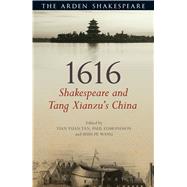- ISBN: 9781472583420 | 1472583426
- Cover: Hardcover
- Copyright: 2/25/2016
Tian Yuan Tan is Reader in Chinese Studies at SOAS, University of London, UK, and the
Secretary-General of the European Association for Chinese Studies.
Paul Edmondson is Head of Research at The Shakespeare Birthplace Trust and
Honorary Fellow of The Shakespeare Institute, University of Birmingham, UK.
Shih-pe Wang is Associate Professor of Chinese Literature at National Chung Cheng
University, Taiwan.
Foreword by Wilt L. Idema, (Harvard University, USA)
Introduction: "Setting the Scene" by Tian Yuan Tan (SOAS, University of London, UK), Paul Edmondson (The Shakespeare Birthplace Trust, UK) and Shih-pe Wang (National Chung Cheng University, Taiwan)
1) The Blockbusters and Popular Stories
- Wei Hua (Chinese University of Hong Kong), "The "Popular Turn" in the Elite Theatre of the Ming after Tang Xianzu: Love, Dream, and Deaths in Tale of the West Chamber"
- Nick Walton (The Shakespeare Birthplace Trust, UK) "Blockbusters and Popular Stories" 2) Making History
- Ayling Wang (Academia Sinica, Taiwan), "A New Form of Public Forum: Dramatizing Current Political Affairs on Stage in the Late-Ming Shishiju Crying Phoenix"
- Helen Cooper (University of Cambridge, UK), "Dramatizing the Tudors"
3) The State and the Theatre;
- Tian Yuan Tan (SOAS, University of London, UK), "Sixty Plays from the Ming Palace, 1615-1618"
- Janet Clare (University of Hull, UK), "Licensing the King's Men: From Court Revels to Public Performance"
4) The Transmission of Dramatic Texts and Printing
- Stephen H. West (University of California, Berkeley, USA), "Tired, Sick, and Looking for Money: Zang Maoxun in 1616"
- Jason Scott-Warren (University of Cambridge, UK), "Status Anxiety: Arguing about Plays and Print in Early Modern London"
5) Audiences, Critics, and Reception
- Shih-pe Wang (National Chung Cheng University, Taiwan), "The Ways of Adapting Peony Pavilion around 1616: Different Viewpoints from Literati, Actors, Readers/Audience, and Critics"
- Anjna Chouhan (University of Leicester, UK), "'No epilogue, I pray you': Audience Reception in Shakespearian Theatre"
6) Music and Performance
- Mei Sun (National Central University, Taiwan), "Seeking the Relics of Music and Performance: An Investigation of Chinese Theatrical Scenes Published in the Early Seventeenth Century (1606-1616)"
- David Lindley (University of Leeds, UK), "Music in the English theatre of 1616"
7) The Concept of Theatre and Its Performance Spaces
- Regina Llamas (Stanford University, USA), "The Idea of a Theatre in Sixteenth-Century China: Xu Wei's (1521-1593) Nanci xulu"
- Will Tosh (Shakespeare's Globe, UK), "Taking Cover: 1616 and the Move Indoors"
8) Dramatic Authorship and Collaboration
- Patricia Sieber (Ohio State University, USA), "Will the Real Late Ming Playwright Stand Up? Social, Economic, and Literary Perspectives on Dramatic Authorship in China, 1545-1616"
- Peter Kirwan (University of Nottingham, UK), "'May I subscribe a name?': Terms of Collaboration in 1616"
9) Localities
- Yongming Xu (Zhejiang University, China), "The Backdrop of Regional Theatre to Tang Xianzu's Drama"
- Paul Edmondson (The Shakespeare Birthplace Trust, UK), "Shakespearian Locales in 1616"
10) Drama, Poetry, and Other Literary Genres
- Xiaoqiao Ling (Arizona State University, USA), "Elite Drama Readership Staged in Vernacular Fiction: The Western Chamber and The Retrieved History of Hailing"
- Kathleen E. McLuskie (University of Birmingham, UK), "'There be salmons in both': Models of Connection for Seventeenth-Century English and Chinese Drama"
Afterword by Stanley Wells (Shakespeare Birthplace Trust, UK)
The New copy of this book will include any supplemental materials advertised. Please check the title of the book to determine if it should include any access cards, study guides, lab manuals, CDs, etc.
The Used, Rental and eBook copies of this book are not guaranteed to include any supplemental materials. Typically, only the book itself is included. This is true even if the title states it includes any access cards, study guides, lab manuals, CDs, etc.
Digital License
You are licensing a digital product for a set duration. Durations are set forth in the product description, with "Lifetime" typically meaning five (5) years of online access and permanent download to a supported device. All licenses are non-transferable.
More details can be found here.






